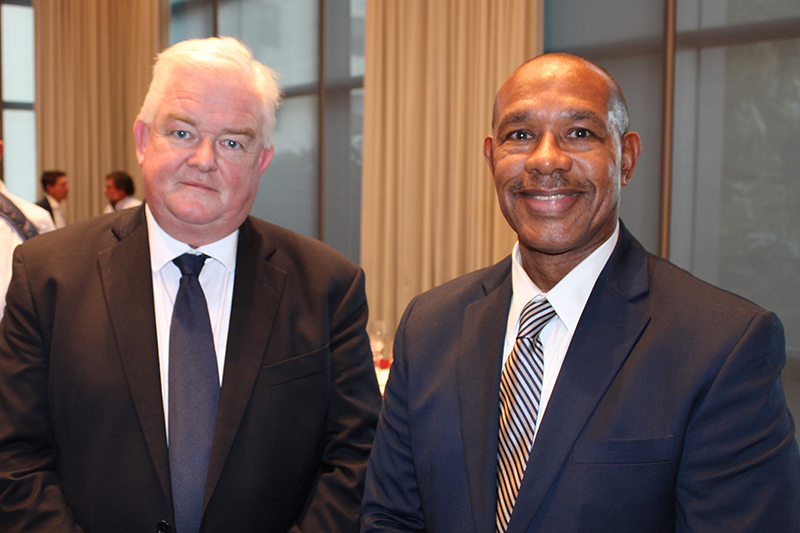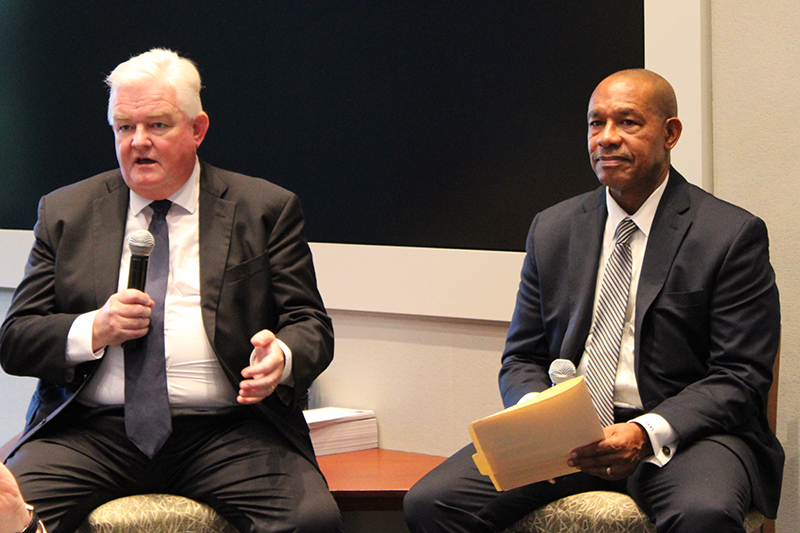ABIC Discuss Corporate Income Tax At AGM
Bermuda’s proposed new Corporate Income Tax [CIT] — and the implications for the island and its International Business sector — was the focus of a discussion hosted by the Association of Bermuda International Companies [ABIC] at its annual general meeting.
A spokesperson said, “Robert Moncrieff, of EY Bermuda Ltd., an experienced international tax practitioner, gave an update on the Bermuda Government’s plan to introduce CIT legislation by the end of this year, what it means for the businesses in scope, and the potential impacts on the island’s competitiveness and reputation as an IB centre.
“The CIT is expected to take effect in January 2025 and will have a rate of 15%. The CIT will only be applicable to Bermuda businesses that are part of a multinational group with annual revenue of €750M or more. The CIT is in line with the Organization for Economic Co-Operation and Development [OECD], in collaboration with the Group of Twenty industrialised countries [G20] Base Erosion and Profit Shifting [BEPS] Pillar 2 initiative to establish a global minimum tax rate around the world.
“In conversation with Wayne Smith, Executive Director of ABIC, Mr. Moncrieff told attendees at ABIC’s AGM that the current zero tax rate on corporate profits was not a determining factor in the choice of Bermuda as a domicile for most companies.
“The zero rate was definitely an asset but it was never the driver for the majority of companies operating in Bermuda,” Mr Moncrieff said. “Access to talent and the regulator were always more important, especially for the commercial [re] insurance industry.
Mr. Moncrieff, who is Global Insurance International Tax and Transaction Services Leader for the EY Region of the Bahamas, Bermuda, British Virgin Islands and Cayman Islands, is ABIC’s representative on the International Tax Working Group that was brought together by the Bermuda Government to advise on the design and implementation of the CIT.
“The charge given to the working group was the appropriate jurisdictional response to what’s going on globally,” Mr Moncrieff said. “And the response was that doing nothing is not an option. Most companies, whether in Bermuda or elsewhere, will end up with an economic burden of taxation on income — it’s a question of where they pay.
“The way it’s supposed to work is that it does not impose a higher yield, in the long run, on anybody than they would otherwise have faced. We have seen the business reaction to be fairly level and there is an appreciation that Bermuda has to do this and that it makes sense to do it.”
“The Government is building a package of Qualified Refundable Tax Credits to help retain Bermuda’s competitiveness. While the nature of these offsets has yet to be determined, they will be important to businesses, especially given existing concerns about the high cost of doing business in Bermuda relative to other jurisdictions,” Mr. Moncrieff added.
“While some in the business community have suggested credits for payroll tax, Mr Moncrieff said the rules prohibited giving credits for taxes paid. “There are limitations on what these refundable tax credits will be,” he added. “We have seen some examples elsewhere. Barbados, for instance, has put out a set of refundable credits, which includes hiring incentives that could also work well for Bermuda.”
A spokesperson added, “The speed at which Bermuda is advancing its CIT legislation has attracted some concern. The Government has held three public consultations in the second half of 2023 on its plans for the new tax as it pushes to enact legislation before year-end.
“Mr. Moncrieff explained that if the legislation is in place by December 31 this year, it will be beneficial to in-scope Bermuda multinational companies by enabling them to take a deferred tax charge in 2024 that could reduce the amount of tax they would otherwise pay in another jurisdiction.
“On the speedy drafting of Bermuda’s legislation, amid a lack of clarity over how other countries will respond to the global minimum tax initiative, he added: “There is still flexibility to change if things shift from the expected during the next year. Mr. Moncrieff said about 1,200 companies would be within the scope of the tax, but calculating the likely government revenue from the tax would be very challenging.
“It’s incredibly difficult to do revenue estimates of corporate income tax,” he added. “There are many pieces in that legislation that will mean some companies don’t pay tax for a fair number of years. The majority of the tax base is in reinsurance, which has volatile returns. All that has to be factored into what the likely revenue yield will be.”
“He said it would make sense to ring-fence some of the tax revenue to help deal with inevitable lean years when tax revenues fall. The Tax Reform Commission, which is tasked with making recommendations for an overhaul of the Bermuda tax system over the next six months, has “an incredibly unenviable task” Mr. Moncrieff said, not made any easier by the uncertainty of CIT revenues.
“While Bermuda’s first tax on corporate profits will help to counter claims from overseas that the island is a “tax haven”, there will continue to be sceptics.
“Reputationally, this is a massive step forward and that is an intangible benefit that is easily overlooked,” Mr Moncrieff said. “Unfortunately, because this tax only applies to a section of the business community, I don’t think the relationship with the OECD moves a great deal.
“People I interact with in Europe and the rest of the world tend to have a very 1980s Hollywood view of island jurisdictions. There is an industry here. We don’t need to tell that to this room. But there are still factions in the US who fail to appreciate that.
“In Europe, they don’t realise that even though this is a tiny island, there’s a lot of genuine commercial activity and Bermuda punches way above its weight in terms of sophistication.
“And Bermuda is not a great place to hide money — it’s a great place to invest money and a disastrous place to hide it, because it will be found.”
After the CIT takes effect in 2025, the scrutiny will continue, Mr. Moncrieff added.
“We will get people expressing opinions on whether our law works properly, and we will be held to account as a jurisdiction by the EU or the OECD or others, as to whether it is effectively policed,” he said.
“Bermuda needs to be viewed as transparent, cooperative and a good corporate citizen: that is essential to our survival. And it’s something the country has done extremely well historically.”
The spokesperson added, “Patrick Tannock, Chair of ABIC and CEO of AXA XL Insurance in Bermuda, thanked Mr. Moncrieff for sharing his insights with ABIC members at the AGM and throughout the development of the CIT legislation.
“Mr. Tannock noted that while the implications of the CIT are profound for the International Business sector and for Bermuda, ABIC are encouraged by the Government’s collaborative and consultative approach and confident that with the recent convening of the Tax Reform Commission under the leadership of Darren Johnson that the Commission will take a holistic look at the island’s tax structure to ensure that Bermuda remains as internationally cost competitive as possible.
“He added that given Bermuda’s strong prudent yet pragmatic regulatory framework and track record of adaptability, innovation, speed to market, transparency, and many other factors that make Bermuda an attractive jurisdiction, he is resolute in his belief that Bermuda is the best suited domicile to capitalize on the opportunities that come from change.
“We’re living in a world where continuous transformation is critical to success,” he said. “Although there are more battles to be fought, I am confident that as long as we embrace change and adaptability and work together to be our own best advocates for our value proposition that Bermuda will remain a domicile of choice.”



